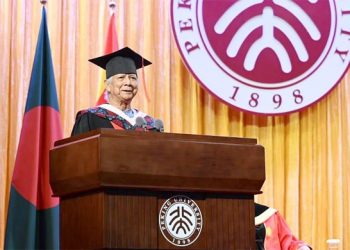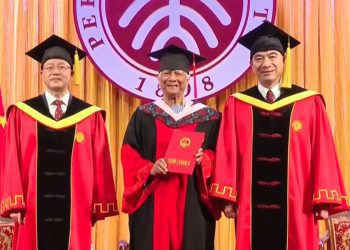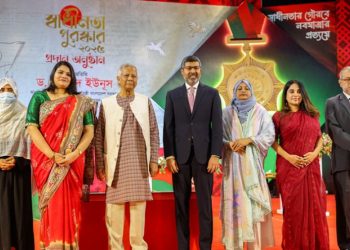Online Desk
The leaders of the United States, Japan, Australia and India are meeting in the Japanese capital, Tokyo, for a second in-person summit of the Indo-Pacific Quad grouping.
At Tuesday’s meeting, the leaders of the informal alliance, which was set up to counter China’s influence, are discussing climate change, technology, maritime surveillance, as well as the fallout from Russia’s invasion of Ukraine – an issue that has risked division among the group.
India, which has close ties with Russia, is yet to condemn Moscow’s war.
US President Joe Biden, in his opening remarks, said the Quad’s goals of securing a “free and open” Indo-Pacific has only been heightened by the Russia-Ukraine conflict.
“We are navigating a dark hour in our shared history,” he said. “The Russian brutal and unprovoked war against Ukraine has triggered a humanitarian catastrophe … This is more than just a European issue. It’s a global issue.”
Biden is set to hold a bilateral meeting with Prime Minister Narendra Modi following the Quad summit.
A White House official, speaking to reporters ahead of the event, said the US president was aware that countries have their own histories, interests and outlooks and “the idea is to build on the commonalities”.
However, the official added that there was broad understanding among the leaders that what was happening in Ukraine was “a serious threat to the international order”.
After meeting Modi, Biden is also set to hold separate talks with Australian Prime Minister Anthony Albanese, who took up his post on Monday after his party won a general election last weekend.
Albanese told the Quad summit that his goals aligned with the priorities of the ad hoc group and pledged to stand together for a “free and open Indo-Pacific”.
The Quad was first set up in the wake of the Indian Ocean Tsunami of 2004 to coordinate humanitarian assistance and has now evolved into what the US calls a “leading regional partnership” to advance the vision of a “free and open Indo-Pacific”.
The group has held military exercises and has established six leader-level working groups on the COVID-19 pandemic, climate change, technology, cybersecurity, space and infrastructure.
At Tuesday’s summit, the leaders are expected to launch a new maritime surveillance initiative to track illegal fishing in the Indo-Pacific, according to the White House.
The Indo-Pacific Partnership for Maritime Domain Awareness (IPMDA) will provide countries in the Pacific, Southeast Asia and the Indian Ocean with the “tools to better maintain sovereignty, better combat illegal fishing and better be able to do rescue at sea and other humanitarian activities,” the US official said.
The leaders will also launch the Quad Fellowship, which will sponsor 100 American, Australian, Indian and Japanese students to study in the US each year for graduate degrees in the fields of science, technology, engineering and mathematics.
The Quad summit is taking place during the last leg of Biden’s five-day trip to Asia, which included meetings with Japanese Prime Minister Fumio Kishida in Tokyo on Monday and with South Korean President Yoon Suk-yeol in Seoul on Saturday.
Biden and Kishida committed to work closely together to address North Korea’s nuclear and ballistic missile programmes and what they called China’s “increasingly coercive behaviour that runs counter to international law”.
The US leader also told reporters that his country would intervene militarily to defend Taiwan in the event of a Chinese attack on the self-governed island. The remarks appeared to signal a shift away from Washington’s decades-long policy of “strategic ambiguity”, but an unnamed White House official later said there was no change in the US approach towards Taiwan.
China, which claims Taiwan as its own, slammed Biden’s comments, saying the US president was “playing with fire”. It has previously also condemned the Quad as an “Asian NATO” set up to contain its global rise.
Separately, Biden also launched in Tokyo on Monday the Indo-Pacific Economic Framework for Prosperity (IPEF), an economic plan that seeks to set standards on labour, supply chains, clean energy and anti-corruption.
The framework, launched in partnership with 12 other countries including India, represents a US attempt to boost economic ties with nations in the Indo Pacific after former President Donald Trump abruptly withdrew from a multi-national trans-Pacific trade agreement.
Meanwhile in Seoul, Biden and Yoon pledged to consider expanding their joint military drills in the face of North Korea’s growing nuclear and missile programmes.
Source: AL JAZEERA


















Discussion about this post